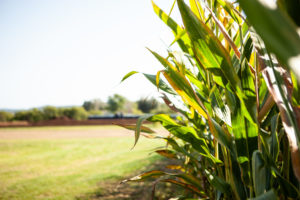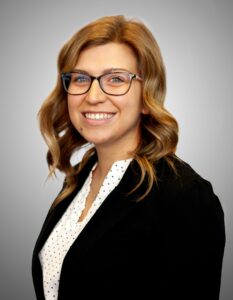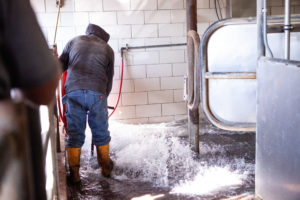 For Wisconsin farmers, recycling goes beyond the green and grey bins at the end of the driveway on trash pick-up day. They have been reducing, reusing and recycling their resources for decades.
For Wisconsin farmers, recycling goes beyond the green and grey bins at the end of the driveway on trash pick-up day. They have been reducing, reusing and recycling their resources for decades.
Ninety-eight percent of Wisconsin farms are family owned and operated, many of which are multi-generational. Being mindful of resources helps to ensure the farm will continue to be successful for generations to come.
There are many examples of how Wisconsin farmers reduce, reuse and recycle resources.
REDUCE:
Reduce soil erosion
Farmers across Wisconsin are using soil-saving practices like reduced-till and cover crops to reduce soil loss. In reduced-till systems, soil is left undisturbed so the soil structure stays intact. Reduced-till systems save time and money, using less fuel and creating less wear and tear on equipment. A cover crop is living mulch for the soil that improve biodiversity and reduce the amount of water that drains from a field. These practices work together to promote healthier soil, leading to cleaner air and water. They also trap excess carbon in the soil and reduce greenhouse gas emissions.
Reduce inputs
Advanced technology and conservation practices help farmers to use their resources and inputs more efficiently. Farmers are producing more food on less land with less inputs. Farmers often test soil before planting to determine composition, pH and balance of nutrients like nitrogen, phosphorus and potassium. These results help to determine the proper type and amount of fertilizer to apply. Reduced inputs are a win-win-win for the farmer, the environment and the consumer. Farmers benefit from a lower cost of production, the environment benefits from lower disturbance and consumers benefit from lower food costs.
REUSE:
Reuse food waste
Food waste, edible food that was spoiled or discarded before consumption, is the number one contributor in landfills. Food waste takes up valuable space in landfills and contributes heavily to greenhouse gas emissions. Farmers can redirect this rejected food as feed for cows and livestock. Potato peels, cranberry hulls, expired cereal, and imperfect candy are just some of the many examples of waste products that can be fed to cows. Using these byproducts in a cow’s diet often offers a cost-savings for the farmer.
Water is a valuable resource for farmers. It is used to clean equipment, irrigate crops and nourish animals. Water can be used more than once before it is returned as part of the natural water cycle. The same water can be used up to four times on a dairy farm:first to cool the milk, then to water the animals, then to clean equipment and, finally, to irrigate crops.
RECYCLE:
Renewable Fuel
Renewable fuels such as ethanol and biodiesel contribute to a cleaner environment while reducing pollution and reliance on fossil fuels. Ethanol is made from corn, deriving its energy from the sun, rain and soil. According to the Wisconsin Corn Growers Association, using ethanol helps to reduce CO2 emissions by almost 30%. The byproducts of ethanol production can be fed to cattle as a high-energy feed source.
Recycle Manure
Manure is a valuable resource for Wisconsin dairy farmers. Manure is used as a natural fertilizer to provide nutrients for crops. It can also be turned into energy with a methane digester. The energy created in the digester can be used to power farms and homes within a community. Some Wisconsin dairy farmers are also recycling manure to use as bedding for their cows. Once the manure is collected, the liquids and solids are separated. The liquid can be recycled for cleaning equipment and watering crops. The solids can be dried and used as bedding. The process starts over again with manure collection.
Farmers are creative thinkers and innovators, using every last bit of their resources to maintain their bottom line and help the environment. Reducing, reusing and recycling resources helps farmers to be more efficient and protect the environment.
National Recycling Day, otherwise known as America Recycles Day, is celebrated annually on November 15, beginning in 1997.
 Rachel Gerbitz is WFBF’s Director of Sustainability Communications and Partnerships. In this newly-created role, she oversees the organization’s sustainability communication efforts. Rachel grew up in Rock County where she was involved in 4-H and the Wisconsin Junior Holstein Association. She now lives in Kaukauna. In her spare time, Rachel manages her small herd of registered Jersey cattle.
Rachel Gerbitz is WFBF’s Director of Sustainability Communications and Partnerships. In this newly-created role, she oversees the organization’s sustainability communication efforts. Rachel grew up in Rock County where she was involved in 4-H and the Wisconsin Junior Holstein Association. She now lives in Kaukauna. In her spare time, Rachel manages her small herd of registered Jersey cattle.



Leave a Reply